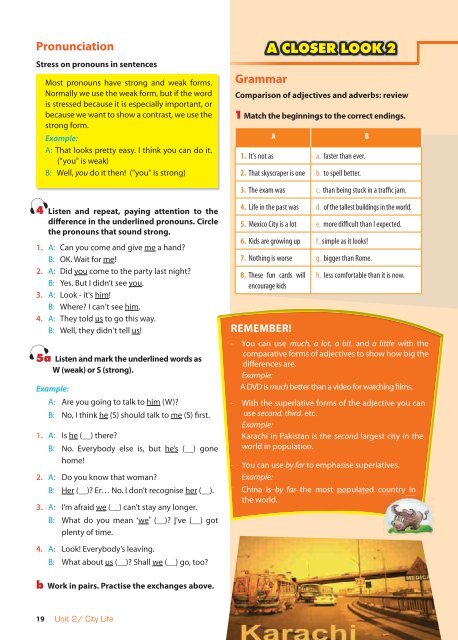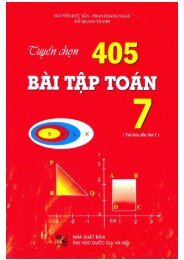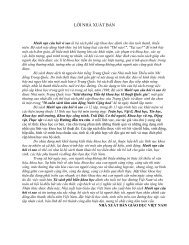Sách giáo viên Tiếng Anh 9 Thí điểm 2 tập (Pilot English 9 for Teacher)
https://app.box.com/s/rnv2yu1duebjhdpkknu2l47p9nmel5ax
https://app.box.com/s/rnv2yu1duebjhdpkknu2l47p9nmel5ax
You also want an ePaper? Increase the reach of your titles
YUMPU automatically turns print PDFs into web optimized ePapers that Google loves.
Pronunciation<br />
Stress on pronouns in sentences<br />
Most pronouns have strong and weak <strong>for</strong>ms.<br />
Normally we use the weak <strong>for</strong>m, but if the word<br />
is stressed because it is especially important, or<br />
because we want to show a contrast, we use the<br />
strong <strong>for</strong>m.<br />
Example:<br />
A: That looks pretty easy. I think you can do it.<br />
("you" is weak)<br />
B: Well, you do it then! ("you" is strong)<br />
A CLOSER LOOK 2<br />
Grammar<br />
Comparison of adjectives and adverbs: review<br />
1 Match the beginnings to the correct endings.<br />
A<br />
B<br />
1. It's not as a. faster than ever.<br />
2. That skyscraper is one b. to spell better.<br />
3. The exam was c. than being stuck in a traffic jam.<br />
4 Listen and repeat, paying attention to the<br />
difference in the underlined pronouns. Circle<br />
the pronouns that sound strong.<br />
1. A: Can you come and give me a hand?<br />
B: OK. Wait <strong>for</strong> me!<br />
2. A: Did you come to the party last night?<br />
B: Yes. But I didn’t see you.<br />
3. A: Look - it's him!<br />
B: Where? I can't see him.<br />
4. A: They told us to go this way.<br />
B: Well, they didn't tell us!<br />
5a Listen and mark the underlined words as<br />
W (weak) or S (strong).<br />
Example:<br />
A: Are you going to talk to him (W)?<br />
B: No, I think he (S) should talk to me (S) first.<br />
1. A: Is he (__) there?<br />
B: No. Everybody else is, but he’s (__) gone<br />
home!<br />
2. A: Do you know that woman?<br />
B: Her (__)? Er… No. I don’t recognise her (__).<br />
3. A: I’m afraid we (__) can’t stay any longer.<br />
B: What do you mean ‘we’ (__)? I’ve (__) got<br />
plenty of time.<br />
4. Life in the past was d. of the tallest buildings in the world.<br />
5. Mexico City is a lot e. more difficult than I expected.<br />
6. Kids are growing up f. simple as it looks!<br />
7. Nothing is worse g. bigger than Rome.<br />
8. These fun cards will<br />
encourage kids<br />
REMEMBER!<br />
h. less com<strong>for</strong>table than it is now.<br />
- You can use much, a lot, a bit, and a little with the<br />
comparative <strong>for</strong>ms of adjectives to show how big the<br />
differences are.<br />
Example:<br />
A DVD is much better than a video <strong>for</strong> watching films.<br />
- With the superlative <strong>for</strong>ms of the adjective you can<br />
use second, third, etc.<br />
Example:<br />
Karachi in Pakistan is the second largest city in the<br />
world in population.<br />
- You can use by far to emphasise superlatives.<br />
Example:<br />
China is by far the most populated country in<br />
the world.<br />
4. A: Look! Everybody’s leaving.<br />
B: What about us (__)? Shall we (__) go, too?<br />
b Work in pairs. Practise the exchanges above.<br />
19 Unit 2/ City Life

















